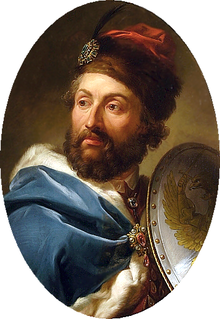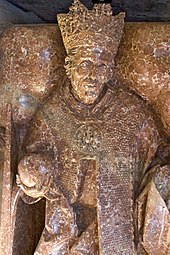Casimir IV. Andrew

Casimir IV. Andreas (called the Jagiellon , in Polish , Lithuanian Kazimieras I Andrius Jogailaitis ; born November 30, 1427 in Krakow , † June 7, 1492 in Grodno ) was Grand Duke of Lithuania from 1440 and King from 1447 from Poland . As the son of Jogaila, he came from the Jagiellonian dynasty .
Life
Casimir was the younger son of the Grand Duke of Lithuania and King of Poland Jogaila and Sophie Holszańska . He was a younger brother of Władysław III. , King of Hungary and Poland. After his death in the Battle of Varna in 1444 and a three-year interregnum , he succeeded him on the Polish throne. Since Casimir was already Grand Duke of Lithuania, both states were reunited in a personal union with this act . During his 45-year rule, the country achieved the status of a great power. Economically and culturally, too, a period of prosperity followed, which in Poland was called the "Golden Age".
On February 10, 1454 Casimir married Elisabeth von Habsburg , the daughter of King Albrecht II and the granddaughter of Emperor Sigismund . This marriage affirmed the Jagiellonian claims to the crowns of Hungary and Bohemia and strengthened the ties between the House of Habsburg and the Jagiellonians . Elizabeth later became known as the mother of the Jagiellonian kings .
During the wedding ceremony, representatives of the Prussian Federation solicited help against the Teutonic Order . The king promised help and the Prussians rebelled. Polish field troops suffered a defeat in the Battle of Konitz and then hardly intervened actively in the war between the Prussian Confederation and the Teutonic Order . The war ended in 1466 in favor of the Confederation and thus also of the king with the Second Peace of Thorn . The order lost the western part of its dominion, which as an autonomous Prussian royal portion submitted to the sovereignty of the Polish crown . For the remaining eastern part of Prussia , the Grand Master had to serve the Polish king in military service. Emperor and Pope did not recognize the peace treaty.
In 1480, Casimir made an alliance with Akhmat Khan , the leader of the Golden Horde , against the Grand Duchy of Moscow under Ivan III . But since the Prussian Pfaffenkrieg took place in the same period , Kasimir could not fulfill his obligations to Akhmat Khan. This contributed significantly to the withdrawal of both parties while standing on the Ugra .
Casimir and Elisabeth had many children. Four sons became kings, two more chose a spiritual life (Casimir was later canonized as St. Casimir). The “Golden Age” of Poland reached its climax under his son Sigismund I. One of the daughters, Hedwig Jagiellon, Duchess of Bavaria (1457-1502) , married in 1475 in the magnificent Landshut Wedding with George the Rich of Bavaria-Landshut.
In the Wawel Cathedral in Krakow , a tumba commemorates the king. The tomb is a work by Veit Stoss . The grave slab shows a three-dimensional representation of the king - laid on a death pillow - with a crown, robe and other attributes of royal dignity, including two three-dimensional coats of arms.
Marriage and offspring
Casimir IV. Andreas married Elisabeth von Habsburg on February 10, 1454 (* 1437 in Vienna; † August 30, 1505 in Cracow), daughter of the German King Albrecht II of Habsburg . The descendants of Kasimir include:
- Vladislav II (* 1456; † 1516), King of Bohemia and Hungary
- Hedwig (* 1457; † 1502), married to George the Rich , Duke of Bavaria-Landshut
- Casimir (* 1458; † 1484), saint and patron saint of Poland and Lithuania
- John I (* 1459; † 1501), King of Poland
- Alexander (* 1461; † 1506), Grand Duke of Lithuania and King of Poland
- Sofia (* 1464; † 1512), married to Margrave Friedrich V of Brandenburg-Ansbach , mother of Duke Albrecht of Prussia
- Elisabeth (* 1465; † 1466)
- Sigismund I (* 1467; † 1548), Grand Duke of Lithuania and King of Poland
- Friedrich (* 1468; † 1503), Bishop of Cracow, Archbishop of Gniezno, Cardinal-Presbyter
- Elisabeth (* 1472; † 1480/81)
- Anna (* 1476; † 1503), married to Duke Bogislaw X. of Pomerania
- Barbara (* 1478; † 1534), married to Duke Georg the Bearded of Saxony
- Elisabeth (* 1482; † 1517), married to Friedrich II. Von Liegnitz and Brieg
Individual evidence
- ↑ As Duke of Poland Casimir IV. , As Grand Duke of Lithuania Casimir I , as King of Poland Casimir II.
- ↑ Lev N. Gumilëv: From Rus to Russia: the ethnic history of the Russians told in an exciting way , Edition Octopus, p. 204
- ^ Schallaburg: Poland in the Age of the Jagiellonians 1386–1572 , catalog for the exhibition May 8 - November 2, Vienna 1986, p. 573
Web links
| predecessor | Office | successor |
|---|---|---|
| Wladyslaw III. |
King of Poland 1447–1492 |
Johann I. |
| Žygimantas Kęstutaitis |
Grand Duke of Lithuania 1440–1492 |
Alexander |
| personal data | |
|---|---|
| SURNAME | Casimir IV. Andrew |
| ALTERNATIVE NAMES | Casimir IV Jagiełło; Casimir the Jagiellonian; Casimir IV (as Duke); Casimir II (as king); Casimir I (as Grand Duke); Casimir IV Jagellonicus; Kazimierz IV Jagiellończyk (Polish) |
| BRIEF DESCRIPTION | Grand Duke of Lithuania and King of Poland |
| DATE OF BIRTH | November 30, 1427 |
| PLACE OF BIRTH | Krakow , Poland |
| DATE OF DEATH | June 7, 1492 |
| Place of death | Grodno , then the Grand Duchy of Lithuania , now Belarus |
